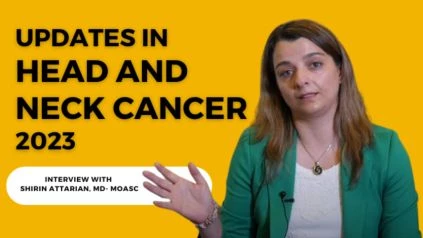Shirin Attarian, MD addresses the escalating incidence of head and neck cancer and highlights that most cases, particularly oropharyngeal cancers, are driven by HPV virus infection.
She discusses HPV vaccination recommendations, suggesting that individuals between 11 and 26 years old should be vaccinated, potentially starting from age 9. Vaccination for those aged 27-45 is possible after physician consultation but might be less effective due to prior exposure. Beyond 45, there are no current vaccination recommendations. Attarian explains that despite younger generations getting vaccinated, the incidence of head and neck cancer is anticipated to rise in older individuals who aren’t vaccinated.
Regarding the Jupiter Two trial’s significance in immunotherapy, Shirin Attarian, MD discusses the reported improvements in progression-free survival and overall survival using Tauropalbap combined with Gyncytamine and Cisplatin as a first-line treatment for recurrent metastatic head and nasal pharyngeal disease. Attarian emphasizes the importance of these findings as they introduce a role for PD1 inhibition in this disease context and potentially pave the way for approvals based on future data from other trials.
Discussing the Continuum trial focused on non-metastatic high-risk locally advanced nasopharyngeal carcinoma, Attarian explains how adding Sintilamab, a PD-1 inhibitor, to the standard treatment regimen leads to improved event-free survival. She notes that overall survival data is still maturing due to the nature of the disease, requiring longer follow-up to confirm differences.
In the FRAIL Immune Trial, which explores Dervo Lomia in cisplatin-ineligible patients with recurrent metastatic head and neck cancer, Attarian highlights the importance of this study for patients with limited treatment options. The trial’s addition of Dervalumab to weekly Carboplatin and Paclitaxel yielded a promising overall survival of 18 months, offering a potential option for this patient group.
Regarding the DEPEND trial’s approach involving Dervalumab-based neoadjuvant chemotherapy followed by response-adaptive CRT for locally advanced HPV-negative head and neck cancer, Attarian emphasizes the trial’s intriguing strategy. It assessed a reduction in radiation dose for patients responding well to induction chemoimmunotherapy. Those with a significant tumor size reduction received lower-dose radiation, yielding improved outcomes, survival, and tolerability. Attarian underscores the importance of larger studies to validate the role of this response-adaptive strategy.

